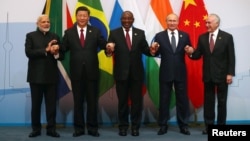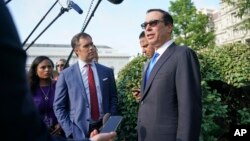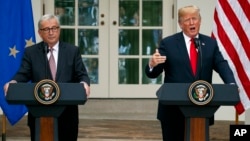Five of the biggest emerging economies Thursday stood by the multilateral system and vowed to strengthen economic cooperation in the face of U.S. tariff threats and unilateralism.
The heads of the BRICS group — Brazil, Russia, India, China and South Africa — met in Johannesburg for an annual summit dominated by the risk of a U.S.-led trade war, although leaders did not publicly mention President Donald Trump by name.
“We express concern at the spill-over effects of macro-economic policy measures in some major advanced economies,” they said in joint statement.
“We recognize that the multilateral trading system is facing unprecedented challenges. We underscore the importance of an open world economy.”
Trump tariffs
Trump has said he is ready to impose tariffs on all $500 billion (428 billion euros) of Chinese imports, complaining that China’s trade surplus with the U.S. is the result of unfair currency manipulation.
Trump has slapped levies on goods from China worth tens of billions of dollars, as well as tariffs on steel and aluminum from the EU, Canada and Mexico.
Xi and Putin
“We should stay committed to multilateralism,” Chinese President Xi Jinping said on the second day of the talks. “Closer economic cooperation for shared prosperity is the original purpose and priority of BRICS.”
Russian President Vladimir Putin, who had a controversial meeting with Trump last week, echoed the calls for closer ties among BRICS members and for stronger trade within group.
“BRICS has a unique place in the global economy: This is the largest market in the world, the joint GDP is 42 percent of the global GDP and it keeps growing,” Putin said.
“In 2017, the trade with our BRICS countries has grown 30 percent, and we are aiming at further developing this kind of partnership.”
Erdogan attends
Turkish President Recep Tayyip Erdogan is also attending the summit as the current chair of the Organization of Islamic Cooperation (OIC) and met with Putin on the sidelines Thursday.
“Our bilateral relations are improving certainly,” the Kremlin cited Putin as saying, hailing the two countries’ cooperation on Syria and in economic matters.
Erdogan in turn spoke about “rapidly developing bilateral relations,” according to the Kremlin, which did not elaborate.
The BRICS group, comprising more than 40 percent of the global population, represents some of the biggest emerging economies, but it has struggled to find a unified voice.
US and EU deal
Analysts say U.S. trade policy could give the group renewed purpose.
In Washington, Trump and European Commission chief Jean-Claude Juncker announced an apparent truce in their trade war after White House talks Wednesday.
The U.S. and the EU will “immediately resolve” their dispute over U.S. steel and aluminum tariffs and subsequent EU countermeasures, U.S. Treasury Secretary Steven Mnuchin confirmed Thursday.
The dollar gained against the euro after the announcement, helping to boost eurozone equities.
The punishing U.S. metals tariffs had angered Washington’s major trading partners, including the EU, and sparked retaliation against important American exports, spooking global stock markets.
Xi arrived in South Africa for the BRICS summit after visiting Senegal and Rwanda as part of a whistle-stop tour to cement relations with African allies.
On Friday, African leaders attending a “BRICS outreach” program will include Paul Kagame of Rwanda, Joao Lourenco of Angola, Macky Sall of Senegal and Yoweri Museveni of Uganda.






